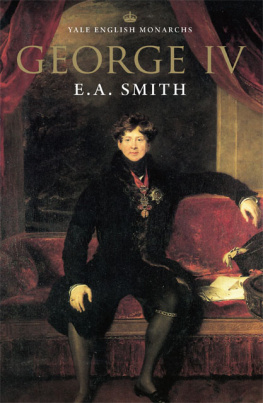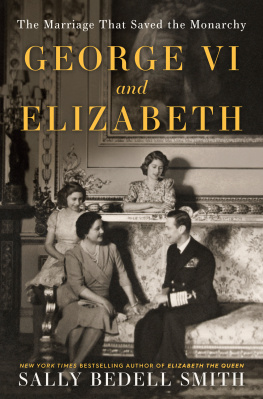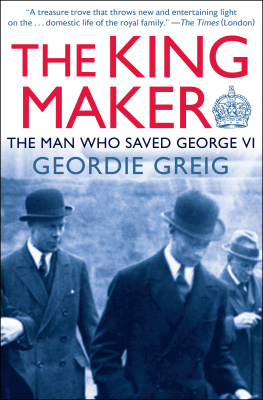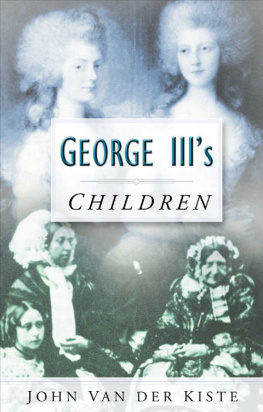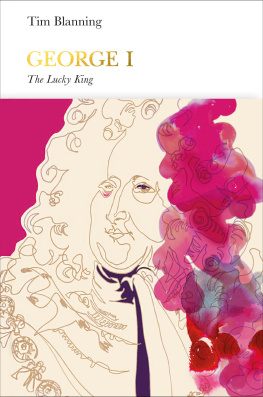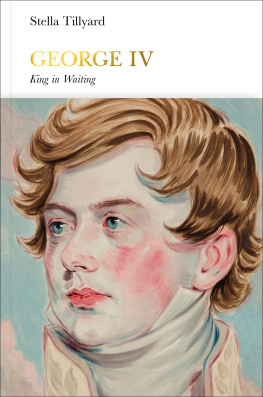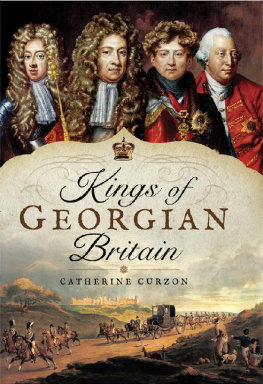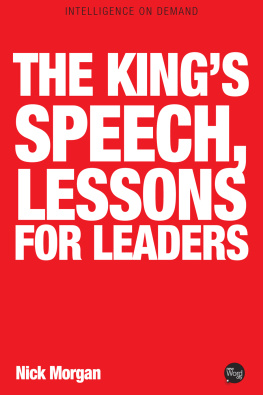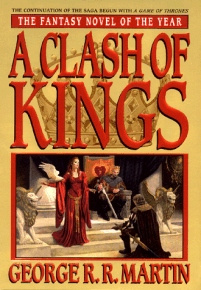
Also in the Yale English Monarchs Series
ATHELSTAN by Sarah Foot
EDWARD THE CONFESSOR by Frank Barlow
WILLIAM THE CONQUEROR by David Douglas
WILLIAM RUFUS by Frank Barlow
HENRY I by Warren Hollister
KING STEPHEN by Edmund King
HENRY II by W. L. Warren*
RICHARD I by John Gillingham
KING JOHN by W. L. Warren*
EDWARD I by Michael Prestwich
EDWARD II by Seymour Phillips
RICHARD II by Nigel Saul
HENRY V by Christopher Allmand
HENRY VI by Bertram Wolffe
EDWARD IV by Charles Ross
RICHARD III by Charles Ross
HENRY VII by S. B. Chrimes
HENRY VIII by J. J. Scarisbrick
EDWARD VI by Jennifer Loach
MARY I by John Edwards
JAMES II by John Miller
QUEEN ANNE by Edward Gregg
GEORGE I by Ragnhild Hatton
GEORGE II by Andrew C. Thompson
GEORGE III by Jeremy Black
GEORGE IV by E. A. Smith
Available in the U. S. from University of California Press

For Virginia
Copyright 1999 by E.A. Smith
All rights reserved. This book may not be reproduced in whole or in part, in any form (beyond that copying permitted by Sections 107 and 108 of the U.S. Copyright Law and except by reviewers for the public press) without written permission from the publishers.
Set in New Baskerville by Best-set Typesetter Ltd, Hong Kong
Library of Congress Cataloging-in-Publication Data
Smith, E.A.
George IV/E.A. Smith.
(Yale English monarchs)
Includes bibliographical references and index.
IBSN 9780300088021 (pbk)
1. George IV, King of Great Britain, 17621830. 2. Great Britain History George III. 17601820. 3. Great Britain History George IV. 18201830. 4. Great Britain Kings and rulers Biography. 5. Regency Great Britain. I. Tide. II. Title: George the 4th. III. Title: George the Fourth. IV. Series.
DA538.A1S6 1999
941.074092 dc21
[b]
9846868
CIP
A catalogue record for this book is available from the British Library.
10 9 8 7 6 5 4 3 2
CONTENTS
PREFACE
There have been several biographies of King George IV. The fullest and most detailed is the two-volume work of Christopher Hibbert, published in 19723. This is an attractively written and thoroughly researched book, but it is a personal biography rather than a work of political analysis and it does not fully evaluate its subjects role and importance in the political world of his time, and his place in the evolution of monarchical government. Joanna Richardsons George IV, a Portrait (1966) is also attractively written, and on the artistic achievements and interests of its subject it is unsurpassed, but it too neglects the political dimension. Roger Fulfords biography (rev. edn 1949) is more balanced but it is relatively short and selective in its treatment, especially on the political side. The earliest writer was Robert Huish in 1831, who set the tone for the prevailing nineteenth-century view of George IV as a libertine unworthy of serious political study. This view was confirmed by Thackeray whose biased and censorious essay in The Four Georges (1855) created a monster of profligacy and incompetence. More serious and scholarly authors included Shane Leslie (1926), P.W. Sergeant (1935) who concentrated on the years before 1820, J.H. Plumb in The First Four Georges (1956) and J.B. Priestley (on the Regency) (1969). All have merits but all are to some degree superficial, and most follow the view that George IV was a dissolute, pleasure-loving dilettante and a feeble, ineffective monarch who dissipated the popularity of the throne created by his father, allowed the constitutional power of the crown to be eroded by unscrupulous politicians, and brought the royal family into a disrepute from which it was rescued only by the virtuous reign of his niece Victoria and her husband Prince Albert. Even the late Arthur Aspinall, whose impeccable and scholarly editions of the correspondence of George III and IV are among the indispensable printed sources for the political history of the later eighteenth and early nineteenth centuries, took an equally censorious view of George IV as Prince, Regent and King, stressing his weaknesses of character, his self-indulgence and neglect of the duties of his position, and his supposed incompetence in affairs of state. George IV has come to be the traditional scapegoat for the decline of the power and reputation of the crown in the last years of the old, unreformed constitution of Great Britain before it was reinvigorated by the Great Reform Act and its consequences.
There were contemporary precedents for this judgement. George and his ministers after 1810 were accused of indifference towards the sufferings of the country in time of war and financial stringency and of supporting the repressive regimes of European despots abroad in opposition to Napoleon and the cause of liberty all over the world the favourite whig toast of Foxs day. George was pilloried in the radical press, which grew more outspoken than ever during and after the wartime years as its favourite panacea for all ills, parliamentary reform, was blocked by the resistance of the old elite, who were alleged to maintain themselves in power by a system of corruption in which the crown was a willing partner. Their identification with the monarch was completed by the alleged treatment of Georges wife, Queen Caroline, who was perceived as the victim of Georges personal vendetta and the symbol of the injustices inherent in the whole system of privilege. She became the short-lived but intensely damaging focal point for criticism of the political establishment as a whole. The increasingly wealthy and influential commercial and professional classes were attracted to radical politics as an affirmation of the growing importance of trade and industry against agriculture and the landed sector of society, and they regarded George IV as a symbol of the age of aristocratic decadence which they sought to end. For all these reasons George grew more unpopular with his subjects, especially in London, the commercial capital of the nation and the centre of political radicalism. Added to this was the resentment felt by his former friends, the self-styled Whigs, at his supposed desertion of them and his apostasy from the old connection with Fox and his companions. His support of their rivals, now coming to be called Tories, was attributed to the influence of his new mistress, Lady Hertford, and her family, who were alleged to have drawn him away in particular from the cause of Catholic emancipation, which was now the cornerstone of whig political identity. Radical attacks were now supplemented by the spiteful personal criticisms of such whig partisans as Thomas Creevey, the diarist, and poets and literary men including Shelley, notorious for the phrase Swellfoot the tyrant, Byron, who condemned Georges treatment of his daughter Princess Charlotte, and Leigh Hunt, who was imprisoned for libelling him in a famous passage as a reprobate, libertine and adulterer. In such hands George was portrayed as the most despised monarch in modern British history.
This study attempts to take a more balanced view. Georges faults were many, but his good points were rarely appreciated. His youthful escapades were chiefly embarked upon in order to spite his father, in reaction against the discipline with which George III sought to model his heir as a worthy successor in the self-imposed battle against the vice and immorality of the times. These adventures laid the foundation of Georges lifelong reputation as a libertine who cared only for worldly pleasures rather than duty towards his country, and this was confirmed by the association with Charles James Fox, one of the most dissolute men of his age and, in the eyes of George III, a traitor to his country as well as a despiser of all moral principle. George by association with the Foxite party appeared to support their programme of political reform and the cause of liberty all over the world, but when in his middle years he came to political responsibility as Regent, and later as King, he abandoned these ideals and attempted to behave responsibly, to support ministers with experience in government and commitment to the national interest in the war against France. His former allies gave him no credit for it but it cannot seriously be contended that he acted otherwise than from a sense of patriotic duty. After the war was over, George did show sympathy for the plight of the poor and unemployed, but in accordance with the prevailing theories of the time he believed that governments could do little to relieve distress in face of the natural order of things. Governments were not entirely heartless poor relief expenditure rose to unprecedented heights in the post-war years but solutions to the problem were not easy to come by.
Next page
